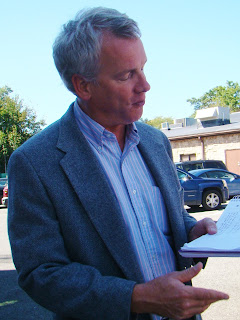The TPP has been negotiated by multinationals secretly for over three years and it threatens our jobs, food safety, environment, sovereignty and our very democracy. Read more: http://www.clearstreammedia.blogspot.com/2013/08/tpp-opposition-growing-and-what-you-can.html
http://hv4nogmos.blogspot.com/2013/09/tpp-global-monsanto-protection-act.html
Thank you to all who came from near and far! Thanks too to Dutchess County Legislator, Joel Tyner for his interactive rap which was very entertaining!
We have stopped bad treaties before and if we can stop Fast Track for TPP, we can stop this one too. Call your elected representatives (Capitol Switchboard- 202 224-3121) and say "No Fast Track for TPP!" If you haven't yet, send your email to ClearStreamMedia@gmail.com to receive updates.
A copy of the letter signed by 40 at the rally and delivered to the Congressman's office is below.
Ulster County MoveOn Council
New Paltz Women in Black
PO Box 955
New Paltz, NY 12561
September 17, 2013
Representative Chris Gibson
Congressman of the 19th District of New York
721 Broadway
Kingston, NY 12401
Dear Congressman Gibson:
Subject: No Fast Track for the Trans Pacific Partnership (TPP)
New Paltz Women in Black
PO Box 955
New Paltz, NY 12561
September 17, 2013
Representative Chris Gibson
Congressman of the 19th District of New York
721 Broadway
Kingston, NY 12401
Dear Congressman Gibson:
Subject: No Fast Track for the Trans Pacific Partnership (TPP)
Many of your constituents are upset to hear some of the details that have been leaked about the Trans Pacific Partnership (TPP). The fact that 600 "advisers" from multinational corporations and financial institutions have been meeting behind closed doors for over three years to negotiate this treaty already casts serious doubts on what is being proposed in our names.
We find it interesting that the former trade adviser for the US, Ron Kirk, said if the American people knew what was in this treaty they would rise up in opposition and it would never pass. We agree. Here is brief summary of the parts we find most egregious.
- The TPP would set up foreign tribunals to challenge national, state and local government laws that corporations say would hurt their future profits. Already under NAFTA and WTO, such lawsuits are increasing. The US has lost 95% of them. This could result in a huge transfer of taxpayer money to corporations already experiencing record profits, but even worse, it would have a chilling effect on any government's ability to pass laws for the environment, public health and public safety. Unbelievably, the "judges" in these tribunals would be corporate attorneys and their decisions final. This is a description of corporate tyranny. http://www.flushthetpp.org/
- Under the TPP, there would be a mad rush to off-shore millions more American jobs to countries where labor is most exploited and environmental regulations the laxest, accelerating a global race to the bottom in wages, benefits and working conditions and worsening climate change.
- The TPP would "harmonize" food safety
standards.
"That means all countries that sign on to the agreement would be required to abide by the lowest common denominator standards of all participating governments. So, for instance, if Vietnam were to allow for higher residues of veterinary antibiotics in seafood than the U.S. allows and Vietnam and the U.S. both sign on to the TPP as trade partners, the U.S. could be forced to lower its standards to allow for imports of seafood from Vietnam or face a lawsuit by the seafood exporter for depriving the company of future sales of its products in the U.S." http://www.alternet.org/food/secret-trade-agreements-threaten-food-safety - The costs of medicine will increase under TPP as patents are extended for big pharmaceutical companies and there are fewer generics.
- Internet freedom under TPP. "would have extensive negative ramifications for users’ freedom of speech, right to privacy and due process, and hinder peoples' abilities to innovate". https://www.eff.org/issues/tpp
- The TPP would undo the already too weak regulations of Wall Street setting us up for more and even worse financial crashes.
- TPP would ban "Buy American" procurement policies.
The Obama administration
is pushing for the Fast Track of TPP, which would only allow Congress to make
an up or down vote without requiring an airing of the provisions of TPP through
public hearings, or allowing Congress to make any amendments. It is the
responsibility of Congress to review and amend treaties. We ask that you not
cede this power to the Executive Branch, which we see as a clear violation of
separation of powers and antithetical to the spirit of our Constitution. We are
asking you to pledge NO to the Fast Tracking of TPP.
We find it shocking that
few in Congress have even been able to read the text of the TPP. Rep Alan
Grayson was allowed to and he said it is "a punch in the face to the
middle class" and added he was not able to even talk about what is in it!
We support Fair Trade
that raises standards and protects American workers, the environment, public
health and public safety. We ask you to stand up for democracy, for US
sovereignty and for your constituents and reject the Fast Tracking of a secret
deal that benefits the 1% at the expense of people and the planet.
Thank you.
Signed by 40 attending today's rally
and here is a photo gallery of other No TPP events. On the second anniversary of OWS, stopping the fast track of TPP was front and center! http://www.popularresistance.org/photo-gallery-from-s17-ows-anniversary/
http://www.flushthetpp.org/video-were-stopping-fast-track-and-the-tpp
and here is a photo gallery of other No TPP events. On the second anniversary of OWS, stopping the fast track of TPP was front and center! http://www.popularresistance.org/photo-gallery-from-s17-ows-anniversary/
http://www.flushthetpp.org/video-were-stopping-fast-track-and-the-tpp
















.jpg)











